Eleven-and-a-half years after a pre-dawn blaze destroyed Cloud Gate Dance Theatre’s home in Bali Township (八里) in what was then-Taipei County, another major icon of Taiwan’s cultural world has been gutted by fire, this time at U-Theatre’s (優人神鼓) compound on Laoquanshan (老泉山) in Taipei’s Wenshan District (萬華).
The fire on Tuesday morning burned the two-story cabin that served as a rehearsal space and storage area, and destroyed 200 drums, gongs and other musical instruments, as well as props and equipment.
The Taipei Fire Department said it was notified of the blaze at 8am and dispatched 15 vehicles and 37 firefighters, and the fire was extinguished in about 40 minutes.
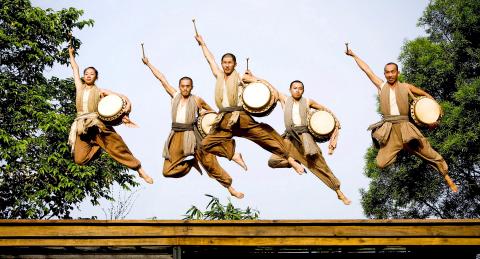
Photo courtesy of U-Theater
U-Theatre founder and director Liu Ruo-yu (劉若瑀) told reporters on Tuesday that the fire had been reported by a resident hiking on the mountain and the prompt response by the fire department had stopped the blaze from spreading into the forest.
However, like the Cloud Gate fire on Feb. 11, 2008, that destroyed the company’s rehearsal studio and warehouse complex, the narrowness of the road leading to the U-Theatre’s compound and steep access path from road presented challenges to the firefighters.
The cause of Tuesday’s blaze is still under investigation.
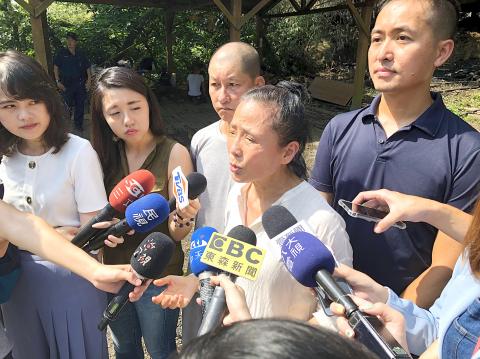
Photo: CNA
The 3,300m2 compound has been used by the troupe as a rehearsal space and its spiritual center since Liu founded the group in 1988. She had been left the land by her father.
Laoquanshan is the soul of the Zen practice that is the core of the drumming and contemporary theater group. It has been where company members spend most of their days, training in the meadow as well as in the cabin in an almost monastic combination of drumming, meditation, taichi, martial arts and dance.
Over the years the company also expanded its performing spaces, initially building a platform at one edge of the compound and creating what it called the U-Theatre Mountain Theater (優人神鼓山上劇場), and then gradually adding pathways on the mountainside so the performers could roam among the trees.
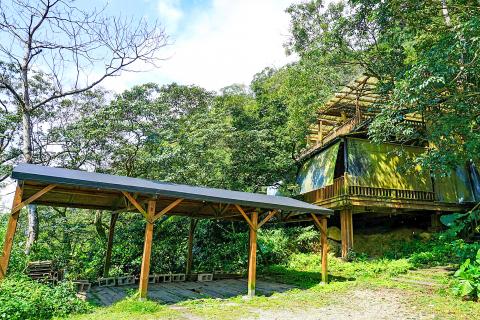
Photo grab from Internet
The company has endured without its Laoquanshan home before. It had to move out in 2005 for a two-year renovation project because of insect and weather damage, and when it was able to move back in, it celebrated with Mountain Dawn (入夜山嵐), a show in December 2007 that was a celebration of life on the mountain.
It was a magical experience to watch the show in the chill of the night air in the openness of the forest, the drums and gongs reverberating as they echoed off the mountain.
The company restaged the show in the National Theater in March 2009, which was a terrific piece of theater, but of course, lacked the intimacy of the original mountain theater version.
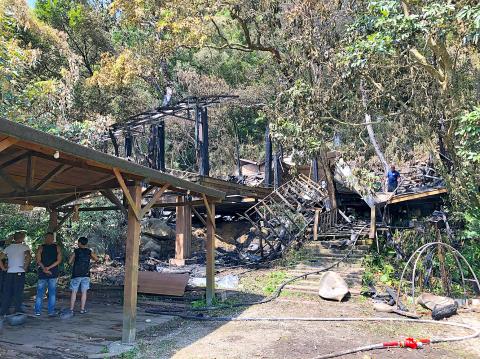
Photo: CNA
U-Theatre also opened its compound to other companies for rehearsals and shows.
In 2008 the Taipei City Cultural Heritage Review Committee listed the U-Theatre Mountain Theater as an area of cultural interest, due to its historical, cultural and artistic value.
However, since it is located in a hillside reserve area and subject to water conservation regulations, the committee ruled that the compound could not be expanded or have additional structures built on it, although existing structures could be rebuilt.
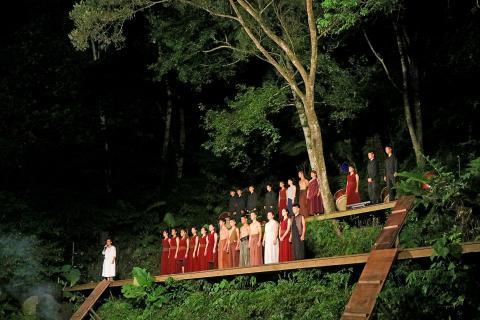
Photo courtesy of U-Theater
That is certainly good news now.
Liu on Tuesday said it could cost more than more than NT$1.5 million (US$47,768) to rebuild the cabin, but did not give an estimate for replacing the lost instruments and other items.
She said the company would borrow instruments from other groups so it can honor its touring and performance commitments, and would move its rehearsals to nearby venues. It also has office space and a studio in its Muxin Road center in Wenshan.
U-Theatre’s reputation has been forged on hardship, discipline and overcoming adversity — as well as meditation and training.
The company is almost as famous in Taiwan for its long walks as it is for its shows. Members walked from Kenting to Taipei in 28 days in 1996, and from Ilan to Taipei the following year. They walked the pilgrim’s path to Mount Kailash in Tibet in 2003 and in 2008 they walked around Taiwan proper to mark their 20th anniversary: a 50-day trip that included about 30 performances in townships along the way.
Now they face another long and challenging road.
Minister of Culture Cheng Li-chiun (鄭麗君) said in a news release that the ministry would allocate emergency funds to help U-Theatre cope with the tragedy, and the Taipei Department of Cultural Affairs also promised to offer assistance.
U-Theater yesterday announced that it would be accepting donations to help in its rebuilding campaign through the U-Theatre Culture & Arts Foundation (財團法人優人文化藝術基金會) account at the Muzha branch of Changhwa Bank ( 彰化銀行), account No. 5352-01-002859-00 or through Chunghwa Post’s Giro Number 19436464.
■ For more information about making a donation, contact the group at (02) 2938-8188.

In the March 9 edition of the Taipei Times a piece by Ninon Godefroy ran with the headine “The quiet, gentle rhythm of Taiwan.” It started with the line “Taiwan is a small, humble place. There is no Eiffel Tower, no pyramids — no singular attraction that draws the world’s attention.” I laughed out loud at that. This was out of no disrespect for the author or the piece, which made some interesting analogies and good points about how both Din Tai Fung’s and Taiwan Semiconductor Manufacturing Co’s (TSMC, 台積電) meticulous attention to detail and quality are not quite up to

April 21 to April 27 Hsieh Er’s (謝娥) political fortunes were rising fast after she got out of jail and joined the Chinese Nationalist Party (KMT) in December 1945. Not only did she hold key positions in various committees, she was elected the only woman on the Taipei City Council and headed to Nanjing in 1946 as the sole Taiwanese female representative to the National Constituent Assembly. With the support of first lady Soong May-ling (宋美齡), she started the Taipei Women’s Association and Taiwan Provincial Women’s Association, where she

Chinese Nationalist Party (KMT) Chairman Eric Chu (朱立倫) hatched a bold plan to charge forward and seize the initiative when he held a protest in front of the Taipei City Prosecutors’ Office. Though risky, because illegal, its success would help tackle at least six problems facing both himself and the KMT. What he did not see coming was Taipei Mayor Chiang Wan-an (將萬安) tripping him up out of the gate. In spite of Chu being the most consequential and successful KMT chairman since the early 2010s — arguably saving the party from financial ruin and restoring its electoral viability —

It is one of the more remarkable facts of Taiwan history that it was never occupied or claimed by any of the numerous kingdoms of southern China — Han or otherwise — that lay just across the water from it. None of their brilliant ministers ever discovered that Taiwan was a “core interest” of the state whose annexation was “inevitable.” As Paul Kua notes in an excellent monograph laying out how the Portuguese gave Taiwan the name “Formosa,” the first Europeans to express an interest in occupying Taiwan were the Spanish. Tonio Andrade in his seminal work, How Taiwan Became Chinese,